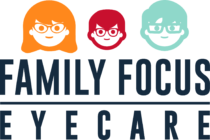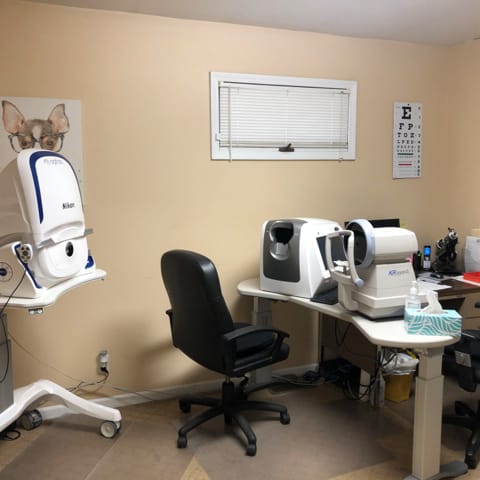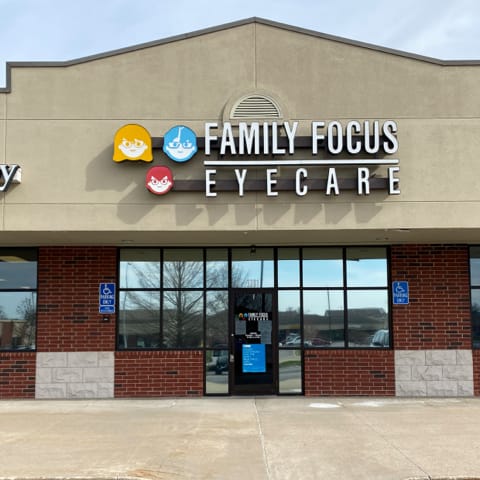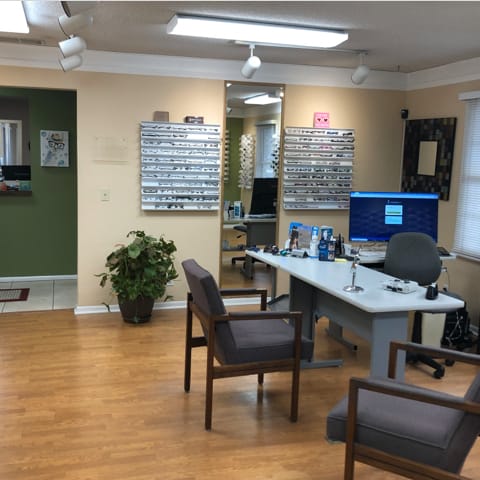Eye Care Is Health Care
Of all the senses, most Americans say losing their eyesight would have the most profound impact on their daily lives. There are many different eye diseases that can cause vision loss, and many of them advance without symptoms in their early stages.
Regular, comprehensive eye exams should be part of your overall healthcare strategy. Let the team at Family Focus Eyecare assess and evaluate your ocular health and identify any diseases before they become a problem.
If we do identify an eye disease, rest assured that we have the knowledge and experience to treat it. Book your next eye exam today.

Glaucoma
Glaucoma is a serious sight-threatening disease that damages the optic nerve. Please visit our dedicated glaucoma page for more information.
Diabetic Eye Diseases
In people under the age of 74, diabetes is the leading cause of blindness. If you have diabetes, you have annual eye exams to monitor your ocular health.
Diabetic Retinopathy
Nearly 1 in 3 people with diabetes will develop retinopathy at some point. Consistently high levels of glucose in the blood can damage the tiny, delicate blood vessels that feed the retina.
In the early stages of retinopathy, the blood vessels weaken, bulge, and leak fluid and blood into the retina. As the condition advances, the blood vessels can burst and new, abnormal vessels grow to replace them. These might also leak.
New blood vessels that interfere with the outflow of fluid from the eye can cause pressure buildup and lead to glaucoma.
Diabetic Macular Edema
If high blood glucose damages the blood vessels in the eye, they can burst and leak into the macula, damaging your central vision. Diabetic macular edema is a very serious condition that can lead to blindness.
90% of blindness caused by diabetes is preventable. Early identification of diabetic retinopathy can help protect your eyesight. Be sure to book a diabetic eye exam to protect your vision.
Age-Related Macular Degeneration
Age-related macular degeneration (AMD) is a leading cause of blindness in adults over 50. As we age, the macula breaks down. The macula is responsible for central vision—that all-important part that allows us to drive, do close-up tasks, and recognize faces.
Some risk factors for AMD include:
- Overexposure to UV rays
- High blood pressure
- Smoking
- Heart disease
In most cases, AMD progresses slowly and painlessly. Symptoms of AMD can include:
- Fuzzy or distorted spots in the central vision
- Difficulty adapting to low light levels
- Straight lines that appear wavy or distorted
- Needing brighter lights when doing close-up tasks
- Difficulty recognizing faces
2 Types of AMD
Age-related macular degeneration comes in 2 forms—wet AMD and dry AMD. Dry AMD is most common, accounting for 8 out of 10 cases of AMD. Dry AMD occurs when the macula thins with age.
Wet AMD is much more serious and occurs when new blood vessels grow under the retina, burst, and leak fluid. This causes scar tissue and is a serious threat to your vision.
Advanced Diagnostic Technology
Identifying AMD early allows us to work collaboratively with you and develop a plan of action before significant vision occurs. Putting a care plan in place at the earliest possible time will preserve as much vision as possible.
Family Focus Eyecare is among the first in the country to offer patients a new test called AdaptDx to detect early stages of AMD. This new diagnostic aid provides a simple, noninvasive measure of dark adaptation, the earliest symptom and biomarker for AMD.
An automatically generated measure called the Rod Intercept™ (RI)—the time in minutes it takes for dark adaptation to occur—can indicate the presence of the disease at least 3 years before it becomes clinically evident.
The AdaptDx test takes less than 10 minutes and can easily fit into a comprehensive eye examination.
Cataracts
Cataracts occur when the normally clear lens in your eye hardens and becomes opaque or cloudy. Generally, cataracts develop slowly and painlessly.
Sometimes, they remain quite small, and vision can be corrected with glasses or contact lenses. But, if they grow and obscure your vision, you may require surgery. Cataract surgery is safe and effective and involves replacing your clouded lens with a clear, artificial one.
Symptoms of cataracts may include:
- Difficulty seeing at night
- Seeing halos around lights
- Frequent changes to lens prescriptions
- Clouded or blurred vision
- Fading or yellowing of colors
We’ll always take a measured approach to recommending surgery, exploring other options first. But, ask yourself the following questions—if you answer yes to any of them, it might be time to seriously discuss your cataracts:
- Are you having a hard time driving or performing your job safely?
- Is reading or watching television becoming a struggle?
- Do you see glares or halos when looking at lights?
- Is it becoming difficult to perform daily tasks like cooking, shopping, or even walking upstairs?
- Are vision problems decreasing your quality of life or threatening your independence?
Preserve Your Sight with Early Detection
Not only do we assist with eye diseases in adults and seniors, but we can detect and treat pediatric eye conditions as well. Please book an appointment today and prioritize the ocular health of your entire family.
Visit One of Our Locations
Columbia
We are in Westbury-1.5 miles further west from our old W. Broadway location, near Toasty Goat and the new Club Carwash
- 725 S. Scott Blvd Suite 101
- Columbia, MO 65203
Our Hours
- Monday: 9:00 AM – 5:00 PM
- Tuesday: 9:00 AM – 5:00 PM
- Wednesday: 9:00 AM – 5:00 PM
- Thursday: 9:00 AM – 5:00 PM
- Friday: 9:00 AM – 5:00 PM
- Saturday: By Appointment
- Sunday: By Appointment
Eldon
Our Eldon location is on Oak Street, two blocks north of the post office and between North and High Street.
- 115 N Oak St
- Eldon, MO 65026
Our Hours
- Monday: 8:30 AM – 5:00 PM
- Tuesday: 8:30 AM – 5:00 PM
- Wednesday: 8:30 AM – 5:00 PM
- Thursday: 8:30 AM – 5:00 PM
- Friday: 8:30 AM – 5:00 PM
- Saturday: By Appointment
- Sunday: By Appointment
Our Brands
View All Brands





Our Testimonials
Dr. Rich is extremely helpful and thoughtful. He cleared up my eye issues within one appointment and even allowed for texts to assess after the appointment. I had been going to a specialist in Columbia for a year and they didn’t even compare to how great Family Focus Eyecare was!
Erin Scrivner
Dr. Barrett is knowledgeable, friendly and practical, I have gone to her for years and trust her. The office staff is great, they are willing to help and make appointments when you need care quickly.
Pamela Didur
The Family Focus Eyecare team is amazing! They really make you feel like home the second you walk through the door. My husband and I both have been very pleased and highly recommend them to anyone in the Columbia area!
Katie Beasley
Twice now, the staff at FFEC have gone above and beyond to help me see clearly. One time I had a contact lens come out while I was driving. It gave me a migrane, and I drove around in desperation trying to find an eye exam since my prescription was expired…. After being turned away in an EMPTY waiting room at the WalMart vision center, and not even being offered a sample pair till an an appointment could be set… I called FFEC and they not only had me come right over, they squeezed me in between two clients, gave me replacement contacts, and informed me my insurance would cover everything because they looked up my plan details for me!! (I didnt even know I had vision coverage). What an exceptional team and business!!!! I was so thankful. This might be the first review I have ever taken the time to write.
Dorian Brownlee
I had a great experience!! Very knowledgeable staff and excited about the new contact lens options! Highly recommend!
Rhonda Bledsoe
Dr. Rich was so great with our 3 year old son! He was patient and sweet. This was during COVID and they were very careful with masks and cleaning. I plan to go back myself and so does my husband.
Amanda Fisher
I had an acute eye problem and FFE was able to get me in within a few days where other places were months out. They diagnosed the problem quickly and I was on my way feeling relieved that I would soon be headache free.
Kasie Sly
The entire team was friendly, efficient and helpful throughout my entire experience. Best customer service experience I’ve had with an eye doctor in Columbia. I would highly recommend them to anyone.
Sarah Carnes
Best of the best! Very quick and courteous. No wasted time and the prices seem very fair for the services rendered. One of my biggest concerns was picking frames and they made it painless. Very pleased, I recommend them without hesitation!
Steve Baumann
Dr. Rich is by far the best eye doctor I have ever met! They went above and beyond to help me find the right pair of frames for me. I get compliments every time I wear them. No matter where I live I will always see Dr Rich for my eye care. I moved to STL and I still make the 2 hour drive to meet with him – totally worth it.
Walter Juarez
Dr. Rich is fantastic! My last eye exam has been years ago and this is my first visit at Family Focus Eyecare. I was immediately impressed with the attentive staff as you walk in, not only were the friendly but also extremely efficient getting me started and keeping me on time. The lobby area is pleasant and has a nice new feel to it. Because this was my first visit I had to go through the typical tests for them to examine my eyes and their technology & equipment are top-notch, it was so easy. Once I met with Dr. Rich he explained everything clearly and especially took the time to ask me many questions about my eyes, habits, difficulties and things I felt needed his attention. After consulting with him thoroughly and running numerous tests I was given a LOWER prescription! He was able to determine my contacts were too strong and what was causing my vision to not be perfect. Everything about my experience was perfect and I highly recommend Dr. Rich and Family Focus Eyecare!
John Sorensen
The staff is so friendly, helpful and very accommodating for kids. My girls are sad that they only get to go once a year.
Joy Lowe

Our Google Reviews

Our Blog
What You Need to Know About Eyelid Mites
Dry EyeEye careDo you ever feel a persistent itching or irritation around your eyes despite maintaining good hygiene? If so, you might be surprised to learn that tiny creatures called eyelid mites could be the culprit. While the mere thought of having mites on your eyelids might make your skin crawl, these microscopic organisms are quite common […]
Protect Your Family’s Eyes with Blue Light Glasses
Eye StrainEyewearBlue light glasses have emerged as protective eyewear, coinciding with the widespread use of smartphones, tablets, and monitors. The COVID-19 pandemic has further increased screen time, with many individuals now working from home, resulting in digital eye strain and from sitting in front of computers or other devices throughout the day. On average, adults spend […]
Navigating Eye Exams for Children with Autism
Eye ExamUncategorizedA trip to the optometrist’s office can be an anxiety-inducing experience for many people, but for children with autism, the challenges can be more upsetting. The sensory sensitivity and unique behavioral variations associated with autism spectrum disorder (ASD) can make eye exams particularly challenging. Understanding Behavioral Variations Children with autism often exhibit behavioral variations that […]
What You Need to Know About Eyelid Mites
Do you ever feel a persistent itching or irritation around your eyes despite maintaining good hygiene? If so, you might be surprised to learn that tiny creatures called eyelid mites could be the culprit. While the mere thought of having mites on your eyelids might make your skin crawl, these microscopic organisms are quite common […]
Protect Your Family’s Eyes with Blue Light Glasses

Blue light glasses have emerged as protective eyewear, coinciding with the widespread use of smartphones, tablets, and monitors. The COVID-19 pandemic has further increased screen time, with many individuals now working from home, resulting in digital eye strain and from sitting in front of computers or other devices throughout the day. On average, adults spend […]
Navigating Eye Exams for Children with Autism
A trip to the optometrist’s office can be an anxiety-inducing experience for many people, but for children with autism, the challenges can be more upsetting. The sensory sensitivity and unique behavioral variations associated with autism spectrum disorder (ASD) can make eye exams particularly challenging. Understanding Behavioral Variations Children with autism often exhibit behavioral variations that […]










